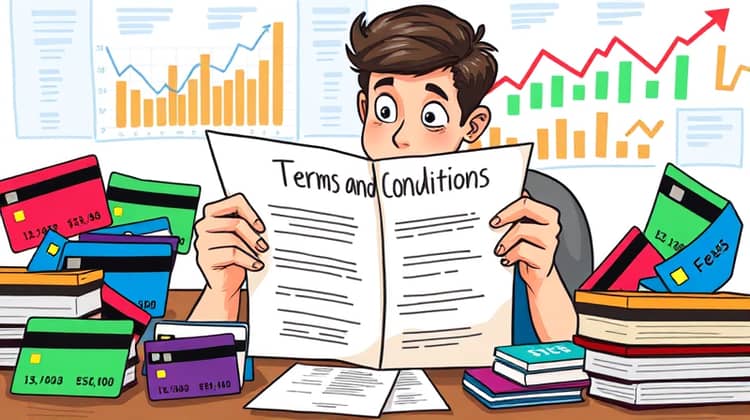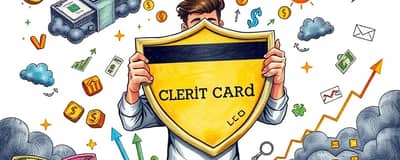In today's financial landscape, credit cards can be both a blessing and a curse. When used responsibly, they offer convenience and various financial benefits, but poor management can lead to debt and financial strain. With this in mind, it is crucial to understand the best practices for utilizing credit cards effectively.
Here, we've compiled eight essential tips to help you navigate the world of credit cards while maintaining your financial health. Each tip will provide you with valuable insights on how to manage your credit card usage, ensuring that you reap the rewards without falling into pitfalls.
1. Understand the Terms and Conditions

Before using any credit card, it is vital to familiarize yourself with its terms and conditions. Each card comes with specific details regarding interest rates, fees, reward systems, and other essential elements that can impact your finances. Ignorance of these details can lead to unexpected charges and higher debt costs.
Carefully reviewing the card's disclosures can significantly affect how you manage your spending and payments. Ensure you understand the grace period, the consequences of late payments, and other pertinent information.
- Annual fees
- Interest rates (APR)
- Rewards and benefits
- Foreign transaction fees
- Late payment penalties
Having a clear understanding of these terms can empower you to make informed decisions and help you avoid unnecessary costs.
2. Set a Budget

Creating a budget when using a credit card is crucial. This can help you avoid overspending and accumulating debt beyond your means. Begin by calculating your monthly income and outlining your expenses to see exactly what you can afford to charge on your card.
Maintaining a budget will also allow you to allocate funds for paying off your credit card balance each month without financial strain.
- Track monthly expenses
- Limit credit spending to a certain percentage of income
- Establish an emergency fund
- Evaluate and adjust your budget regularly
By sticking to a well-defined budget, you can enjoy the benefits of your credit card while minimizing the risk of debt accumulation.
3. Pay the Full Balance Every Month

One of the key principles of responsible credit card use is paying the full balance each month. This practice helps you avoid interest charges and maintains your credit score by showing lenders that you can manage your debt effectively. Additionally, paying off your balance allows you more freedom to use your credit for future purchases without worrying about rising debt.
It’s also important to set up reminders or automated payments to ensure that you never miss a payment, which can result in late fees and damage your credit score.
By making it a habit to pay off your balance in full, you’ll save money and keep your financial health intact.
4. Avoid Cash Advances

Cash advances can seem like an easy solution when you need funds quickly, but they often come with hefty fees and high-interest rates. Borrowing against your credit card to withdraw cash can lead genuinely exhausting financial cycles that are difficult to escape from.
It's advisable to find alternative ways to cover expenses rather than relying on cash advances. Maintaining a strategic approach to cash flow is critical.
- Research alternatives like personal loans
- Use your checking account instead
- Utilize emergency savings if available
- Avoid using cash advances for impulse purchases
By steering clear of cash advances, you will prevent incurring unnecessary debt and maintain better control over your finances.
5. Monitor Your Credit Card Activity

Frequent monitoring of your credit card activity is essential in catching fraudulent charges and managing your budget effectively. Regularly checking your statements and transactions helps you stay informed of your spending habits and adjust accordingly if you're exceeding your budget.
Additionally, actively managing your credit card use allows you to identify potential errors and report them quickly to your credit card issuer, preventing any damage to your financial health.
- Check statements regularly
- Set up account notifications for transactions
- Review billing cycles for accuracy
- Stay informed on interest rates and fees
By keeping a close eye on your credit card activity, you ensure greater financial security and avoid unexpected surprises on your statements.
6. Know Your Credit Limit

Understanding your credit limit is vital to avoiding overspending. Exceeding your limit can result in fees and negatively impact your credit score. Knowing your limit allows you to budget accordingly and maintain your credit utilization ratio at a healthy level.
Aim to keep your credit utilization below 30% of your total available credit to maintain a good credit score.
7. Look for Rewards and Benefits

Many credit cards offer attractive rewards and benefits, including cashback, travel points, and discounts. However, it's essential to select a card that aligns with your spending habits to maximize these rewards without overspending.
Evaluate different credit card options and choose one that offers benefits that complement your lifestyle, whether it’s dining rewards, airline miles, or retail discounts.
- Cashback on purchases
- Airline rewards and points
- No foreign transaction fees
- Exclusive discounts and offers
By being strategic about your credit card usage and taking advantage of rewards programs, you can reap additional benefits while maintaining responsible spending practices.
8. Use Credit Cards to Build Credit

Using credit cards wisely can also play a crucial role in building your credit history and improving your credit score. A strong credit score is vital for securing loans and favorable interest rates in the future, and responsible credit card use contributes significantly to this.
By keeping your balances low and making timely payments, you not only manage your current finances more effectively but also create a solid foundation for your financial future.














